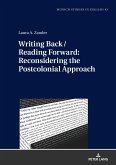Australia's official Reconciliation project confronted Australians with the continuous violent dispossession suffered by the country's Indigenous peoples and the pressing need to offer a public apology to them. While trauma became a tool whereby to create paths of empathy and reconciliation between indigenous and non-indigenous Australians, it was also a manipulative strategy to deny the country's shameful history. This book examines Gail Jones's literary contribution to such debates. It examines Gail Jones's questioning of Australia's victimology narratives, and offers an insightful discussion of the transmedia, transnational and multidirectional approach to trauma in the reconciliation-related novels she published during John Howard's vexed Liberal Government (1996-2007).
Bitte wählen Sie Ihr Anliegen aus.
Rechnungen
Retourenschein anfordern
Bestellstatus
Storno








